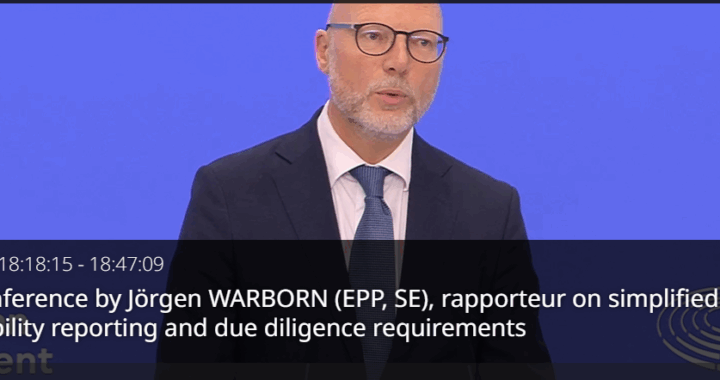⭕ The requirements for corporate assessment of sustainability impacts, risks and opportunities (IROs) are now defined by the ESRS as part of the EU Directive CSRD.
When performing its Double Materiality Assessment, the undertaking shall consider the list of sustainability topics in ESRS 1 AR 16, in addition to any entity-specific sustainability topics not covered by this list.
The outcome of the undertaking’s sustainability due diligence process informs the undertaking’s assessment of its material IROs. Due diligence is the process by which undertakings identify, prevent, mitigate and account for how they address the actual and potential negative impacts on the environment and people connected with their business. (ESRS 1, par. 58-59)
In the case of a potential negative human rights impact, the severity of the impact takes precedence over its likelihood. (ESRS 1, par. 45)
The IROs have to be faithfully represented, which means that the information needs to be (i) complete, (ii) neutral and (iii) accurate. (ESRS 1, QC 5)
A complete depiction of an IRO includes all material information necessary for the reader of the report to understand that IRO. This includes how the undertaking has adapted its strategy, risk management and governance in response to that IRO, as well as the metrics identified to set targets and measure performance. (ESRS 1, QC 6)
Opportunities shall not be overstated and risks shall not be understated. Information shall not be netted or compensated to be neutral. (ESRS 1, QC 8)
Accuracy requires that assertions are reasonable and based on information of sufficient quality and quantity, descriptions are precise, and estimates, approximations and forecasts are clearly identified as such. (ESRS 1, QC 9)
⭕ Corporate sustainability due diligence obligations are now defined by the EU Directive CSDDD, which also includes a list of human rights and prohibitions.
Here is where it becomes clear that the CSRD and the CSDDD are complementary.
The CSRD is an obligation to publish, while the CSDDD is an obligation to act (on matters already defined in international human rights instruments).
⭕ The CSDDD list of human rights and prohibitions greatly overlaps the list of sustainability topics to be assessed as part of the ESRS.
And it also becomes clear that in many (if not most) cases, the assessment of material negative impacts needs to be based on the severity of the impact rather than its likelihood, as a majority of topics to be assessed are listed as human rights.
Below you will find the CSDDD list of human rights and prohibitions as well as CSRD topics to be assessed during your DMA – they speak for themselves.
ANNEX, Part I, DIRECTIVE (EU) 2024/1760 of 13 June 2024 on corporate sustainability due diligence (CSDDD)
RIGHTS AND PROHIBITIONS INCLUDED IN INTERNATIONAL HUMAN RIGHTS INSTRUMENTS
- The right to life
- The prohibition of torture, cruel, inhuman or degrading treatment
- The right to liberty and security
- The prohibition of arbitrary or unlawful interference with a person’s privacy, family, home or correspondence and unlawful attacks on their honour or reputation
- The prohibition of interference with the freedom of thought, conscience and religion
- The right to enjoy just and favourable conditions of work, including a fair wage and an adequate living wage for employed workers and an adequate living income for self-employed workers and smallholders, which they earn in return from their work and production, a decent living, safe and healthy working conditions and reasonable limitation of working hours
- The prohibition to restrict workers’ access to adequate housing, if the workforce is housed in accommodation provided by the company, and to restrict workers’ access to adequate food, clothing, and water and sanitation in the workplace
- The right of the child to the highest attainable standard of health; to education; to an adequate standard of living; to be protected from economic exploitation and from performing any work that is likely to be hazardous or to interfere with the child’s education, or to be harmful to the child’s health or physical, mental, spiritual, moral or social development; to be protected from all forms of sexual exploitation and sexual abuse and to be protected from being abducted, sold or moved illegally to a different place in or outside their country for the purpose of exploitation
- The prohibition of the employment of a child under the age at which compulsory schooling is completed and, in any case, is not less than 15 years, except where the law of the place of employment so provides
- The prohibition of the worst forms of child labour (persons below the age of 18 years) (slavery, sale, trafficking, debt bondage, serfdom, forced or compulsory labour, including the forced or compulsory recruitment of children for use in armed conflict, prostitution, pornography, use, procuring or offering of a child for illicit activities, in particular for the production or trafficking of drugs, work which, by its nature or the circumstances in which it is carried out, is likely to harm the health, safety or morals of children
- The prohibition of forced or compulsory labour
- The prohibition of all forms of slavery and slave-trade, including practices akin to slavery, serfdom or other forms of domination or oppression in the workplace, such as extreme economic or sexual exploitation and humiliation, or human trafficking
- The right to freedom of association, of assembly, and the rights to organise and collective bargaining (including freedom to form or join trade unions without unjustified discrimination or retaliation and the right to strike)
- The prohibition of unequal treatment in employment, unless this is justified by the requirements of the employment (including the payment of unequal remuneration for work of equal value, discrimination on grounds of national extraction or social origin, race, colour, sex, religion, political opinion)
- The prohibition of causing any measurable environmental degradation, such as harmful soil change, water or air pollution, harmful emissions, excessive water consumption, degradation of land, or other impact on natural resources, such as deforestation, that: substantially impairs the natural bases for the preservation and production of food; denies a person access to safe and clean drinking water; makes it difficult for a person to access sanitary facilities or destroys them; harms a person’s health, safety, normal use of land or lawfully acquired possessions; substantially adversely affects ecosystem services through which an ecosystem contributes directly or indirectly to human wellbeing
- The right of individuals, groupings and communities to lands and resources and the right not to be deprived of means of subsistence, which entails the prohibition to unlawfully evict or take land, forests and waters when acquiring, developing or otherwise using land, forests and waters, including by deforestation, the use of which secures the livelihood of a person
ESRS 1 AR 16, ANNEX I, European Sustainability Reporting Standards (ESRS), DIRECTIVE (EU) 2022/2464 of 14 December 2022 as regards corporate sustainability reporting (CSRD)
TOPICS TO BE CONSIDERED IN DOUBLE MATERIALITY ASSESSMENT (DMA)
SOCIAL TOPICS
- Working conditions, including:
- Secure employment
- Working time
- Adequate wages
- Social dialogue
- Freedom of association, the existence of works councils and the information, consultation and participation rights of workers
- Collective bargaining, including rate of workers covered by collective agreements
- Work-life balance
- Health and safety
- Equal treatment and opportunities for all, including:
- Gender equality and equal pay for work of equal value
- Training and skills development
- Employment and inclusion of persons with disabilities
- Measures against violence and harassment in the workplace
- Diversity
- Child labour
- Forced labour
- Adequate housing for workers
- Water and sanitation for workers
- Privacy for workers
- Communities’ economic, social and cultural rights
- Adequate housing, Adequate food, Water and sanitation, Land-related impacts, Security-related impacts
- Communities’ civil and political rights
- Communities’ freedom of expression
- Rights of indigenous peoples
- Privacy for consumers and/or end-users
- Freedom of expression for consumers and/or end-users
- Access to (quality) information for consumers and/or end-users
- Personal health and safety of consumers and/or end-users
- Protection of children
- Social inclusion of consumers and/or end-users (non-discrimination, access to products and services, responsible marketing practices)
ENVIRONMENTAL TOPICS
- Climate change adaptation and mitigation
- Energy efficiency and renewable energy deployment
- Pollution of air, water, soil, living organisms and food resources
- Substances of concern and of very high concern
- Microplastics
- Water consumption, withdrawals, discharges
- Water discharges in the oceans
- Extraction and use of marine resources
- Direct impact drivers of biodiversity loss
- Impacts on the state of species
- Impacts on the extent and condition of ecosystems
- Impacts and dependencies on ecosystem services
- Resources inflows, including resource use (circular economy)
- Resource outflows related to products and services (circular economy)
- Waste
—
Stay tuned for more CSRD, ESRS and CSDDD insights.
✅ Adopt a streamlined, digital and taxonomy-centric ESRS report preparation with Cleerit ESG
getCSRDready, #CSRD, #ESRS, #CSDDD, #ESG, #Strategy, #Governance, #SustainabilityReporting, #Digitalisation, #CleeritESG






